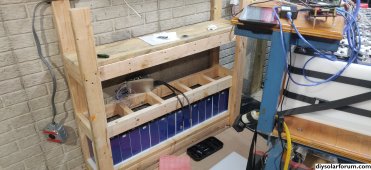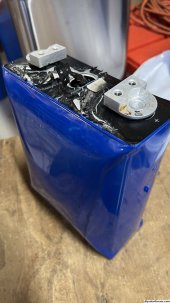Redodo has been selling 12 volt, 100ah RV style LIFEPO4 batteries recently at some low prices on Amazon and Ebay.
Just bought 4 of them for about $210 each with shipping.
1250 watt-hours per battery, so $210/1250 = 16.8 cents per watt-hour, assembled, with a BMS, and a 5 year warranty. Nothing to do other than charge them and hook them up. If one dies, I can pull it out and replace it and hopefully have it covered under warranty if it is less than 5 years old. The Redodo cells are made up of prismatic 100ah cells along with a BMS, stuck into an automotive style box. There is a lot of extra space in the box. There are some teardown videos on Youtube.
I looked at doing a DIY 48 volt battery but with the cost of BMS's, cells and shipping it didn't seem to make any sense.
Redodo says the built in BMS can support 4S4P without any issues.
I previously bought 4 Redodo batteries and they seem to be fairly high quality.
Together with the previously purchased 4 batteries I have about 10 kwhr of battery at 48 volts (4S2P) for about $1700. The first few I purchased were more expensive.
I've done electrical/electronic work for a long time, so hooking up DIY batteries would not be a problem, I just didn't see how it makes any sense right now.
The server rack batteries seem ok but if one dies, then what? Plus they are not cheap. If one fails I am out a lot of capacity. Do I setup a truck shipment to send it back for warranty? Do I tear it apart and try and replace the bad cell/s?
I doubt they were made to be user serviceable.
Anyway, tell me why I was wrong to purchase these Redodo batteries. I am seriously looking for honest criticism.
Is this the wrong way to go?
Depending on how my solar setup goes, I may be expanding this Redodo battery bank to 20 kwhr fairly soon. If this is the wrong direction, save me some money!

Thanks, Dave





